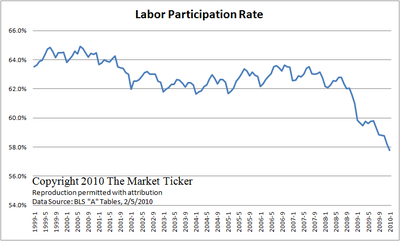This from Washington's Blog:
"The Russians proved that communism is a joke.And when China moved towards a mixed capitalist-socialist system, it was the nail in the coffin for communism worldwide. Whose left? North Korea?
So more or less everything the Russians and Chinese said about communism was wrong. It failed.
Unfortunately, a lot of what they said about capitalism was right.
Specifically, while I know next to nothing about Marx, Engels or other communist thinkers, it seems pretty obvious that the U.S. is in a phase of "late stage capitalism" where financial speculation by huge companies has replaced productive investment, capital improvements, innovation, and job creation, and the financial sector has grown so big - and inequality has grown so large - that it has destroyed democracy like a malignant cancer.
As economist Kimball Corson wrote last year at Seeking Alpha:
In a nutshell and stripped of his own inflammatory terminology and technical economic errors, Marx had this to say in his book, Das Kapital.
Marx argued that at capitalism would succeed in its initial stages quite well in promoting growth by means of capital investment in new technology and improved means of production. Everyone would prosper. As capitalism developed, however, he argued that capitalists would appropriate to themselves more and more of the profits or income from the economy and that laborers would come to have increasingly less.
Over time, in time and such circumstances, Marx claimed that, first, capitalistic economies would undergo ever more vicious cyclical swings from boom to bust. These cycles and the on-going process of capitalism would, second, result in ever richer capitalists and ever poorer working classes, until, finally, at some point, laborers would revolt and take over the means of production, causing Socialism to ensue as a result. Socialism, in turn, was merely a transitional step to Communism.
***
What we observe of the American economy, at its present stage, is exceptionally close to what Marx described, whether we like it or not. Let me describe the ways:
1. Earlier in our history, up until about 30 years ago, capitalism as it was practiced in the United States did do very well and materially aided a good standard of living for most Americans.
2. Since then, real wages have stagnated and income has become seriously concentrated in the upper income households. The top 1/10 of 1%, get 6% of all income. As Harvard Professor Elizabeth Warren explains it, for long stretches of time in recent years, the growth in the nation's GDP has gone almost entirely to the top 1% or less of the population. The top 40% get about 78% of all income. Now couple this with the following fact:
3. Productivity Growth Quarter in 4Q 2009 was 6.2%. For the year, it came to 5.1%. As Brad DeLong describes this current slice of reality, “The flip side of the jobless recovery is a high productivity-growth recovery--and, with stagnant wages, a rise in the profit share (read, capitalist’s take). This is becoming more prevalent.
4. The distribution of income and wealth in the U.S. has progressively become worse over the last several decades as real wages have stagnated or declined a bit.
5. So to have our cyclical booms and busts become more severe over the last decade. We have had the dot com boom and bust and now the housing boom and bust. We are anything but stable, especially now as we are loaded up with debt and deficits.
6. The share of income or profits being generated by small business is falling and the share of total profits being generated by large businesses is increasing.
7. Government has enacted much special interest legislation contrary to the public interest, to aid the concentration of wealth and income in the hands of the wealthiest and feather representatives own beds.
8. Now, what we see with increased productivity and the maldistribution of income and wealth is a growing surplus of labor or the unemployed.
9. We are beginning to see embryonic development of reactionary grass roots political movements, such as the Tea Party crowd. While now small, without good leadership and ill-focused, grass root movements do not have to stay that way. Once started, they can change quickly and gain good focus and leadership.
10. As a matter of public policy, we are adamantly and deliberately ignoring entirely too much that is important here, all to our prospective detriment. In short, we are asking for public upheaval and revolt.
11. The public, both right and left, are truly exasperated with our federal government, frustrated with our economy, mad at Congress and the Administration and ripe for something new that offers us all a better prospect.
Indeed, polls show that the percentage of Americans who view socialism favorably has skyrocketed since the credit crisis. See this, this and this.
However, unlike Marx (or Corson), I don't think that transitioning from a broken form of capitalism to communism would be a good thing. Do you want to live under a brutal tyrant like Stalin, Mao, Pol Pot or Kim Jong Il? I don't.
As I wrote in an essay called "Don't Blame Capitalism for Wall Street's Corruption and Lawlessness":
As I wrote last year:When Mahatma Gandhi was asked what he thought about Western civilization, he answered:
I think it would be a good idea.I feel the same way about free market capitalism.It would be a good idea, but it is not what we have now. Instead, we have either socialism, fascism or a type of looting.
If people want to criticize capitalism and propose an alternative, that is fine . . . but only if they understand what free market capitalism is and acknowledge that America has not practiced free market capitalism for some time.
Of course, even Adam Smith didn't believe in unrestrained free market capitalism. And a free market is not possible without strong laws against fraud.Does this mean that free market capitalism is dead?
No. And I'm not sure that there is any better alternative.
But capitalism has to grow up and become less naive, relying less on a blind faith in "the invisible hand" and more on an understanding of human nature, including insights from the field of behavioral economics.
It must include sophisticated checks and balances to make sure that the system is not gamed, instead of childish ideas about the "inherent stability" of the market.
And it must make sure that the poker game doesn't suddenly end when one of the players gets all of the chips.
Of course, with high-frequency trading dominating the market (and see this), frontrunning, permanent bailouts (and see this), government-sponsored credit rating scams and enterprises, the creation and maintenance by the government of banks so big that their very size warps the entire system, socialism for the big boys, and all of the other shenanigans going on, we don't currently have free market capitalism.
So the bottom line is really that the communist philosophers accurately predicted that capitalism would become corrupted ... just as communism became corrupted by rulers who lived in the lap of luxury and gave themselves all the perks while they imposed poverty and extreme oppression on their people.
Indeed, anyone who assumes that any system - communism, capitalism or any other "ism" - is infallible and that its leaders don't have to be held accountable is just a useful idiot.
I think a large part of the problem with both communism and late stage capitalism is too much power in too few hands - whether in the hands of the "Party" or of the oligarchy of big banks (made enormous by the government, not by free market capitalism), the outcome is the same ... the little guy gets shafted."


No comments:
Post a Comment